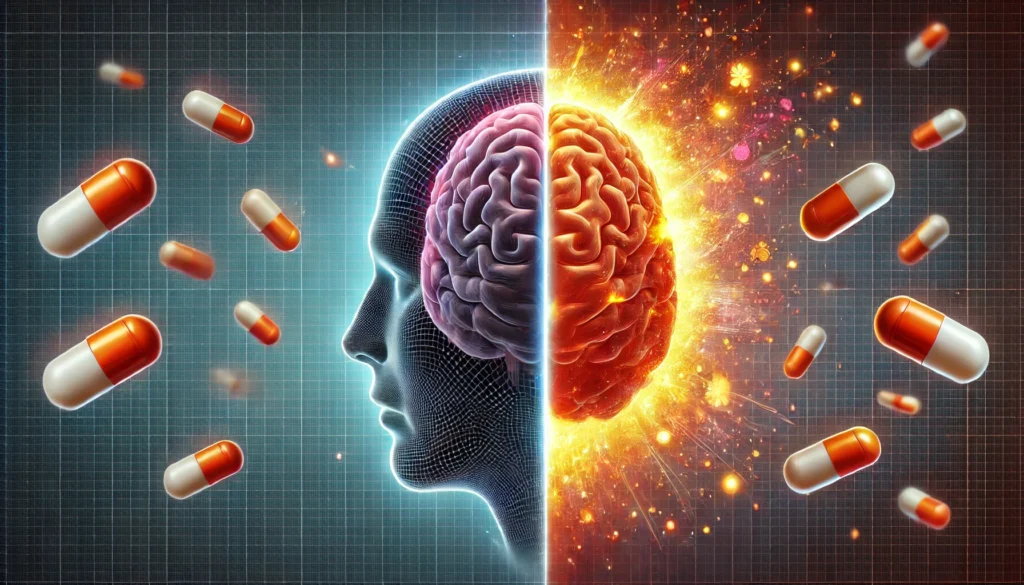In today’s fast-paced world, the quest for enhanced cognitive function and mental clarity is more intense than ever. From students and professionals to biohackers and health enthusiasts, the appeal of brain supplements, often termed “nootropics,” is undeniable. But are these brain-boosting pills, powders, and potions truly worth the hype?
In this comprehensive exploration, we’ll delve into the world of brain supplements, examining their efficacy, the science behind them, and whether they live up to the promises made on their labels.
You may also like: Mindfulness Techniques to Improve Attention Span
The Rise of Brain Supplements
Brain supplements, or nootropics, have seen a surge in popularity over recent years, driven by the desire for improved cognitive function, better memory, and enhanced focus. This trend is fueled by an increasing body of research suggesting that certain vitamins and compounds can support brain health.
Historical Context
The notion of enhancing mental acuity is not new. Ancient civilizations have long sought out natural substances believed to improve cognitive function. For instance, the use of Ginkgo Biloba dates back thousands of years in traditional Chinese medicine, where it was prized for its supposed ability to enhance memory and circulation. Similarly, in ancient Indian Ayurveda, herbs like Ashwagandha and Brahmi were used to promote mental clarity and longevity.
In the Middle Ages, scholars and alchemists experimented with various elixirs and potions, hoping to unlock the secrets of the mind. The Renaissance period saw a renewed interest in the study of the human brain, leading to early scientific explorations of cognitive enhancers. Today, the focus has shifted to scientifically formulated supplements designed to support various aspects of brain health, from memory and focus to overall cognitive function.
Modern-Day Drivers
In our current era, several factors contribute to the booming interest in brain supplements. The rise of digital technology has increased the demand for sustained mental performance, as individuals are required to process vast amounts of information rapidly. The competitive job market and the pressure to excel academically have further fueled the desire for cognitive enhancers.
Additionally, an aging population is seeking ways to maintain cognitive health, driving demand for preventive measures against age-related decline. These societal shifts, combined with the increasing availability of information online, have made brain supplements more accessible and appealing than ever before.
Market Trends
The nootropic market is expanding rapidly, with new products being introduced regularly. This growth is driven by consumer interest in self-improvement and wellness, as well as advancements in ingredient sourcing and formulation technology. Online platforms have made it easier for consumers to access a wide range of products, each claiming unique benefits and proprietary blends.
As a result, the industry has seen an influx of both traditional supplements and novel compounds, leading to a diverse array of options for consumers. This diversity, while beneficial, also presents challenges in terms of quality assurance and consumer education, necessitating careful consideration when choosing products.
Key Ingredients in Brain Supplements
Understanding the components of brain supplements is crucial in evaluating their potential benefits. These supplements often contain a mix of vitamins, minerals, herbal compounds, and synthetic ingredients aimed at enhancing cognitive function.
Vitamins and Minerals
Certain vitamins and minerals are essential for maintaining optimal brain health. Key players include:
- Vitamin B12: Vital for nerve function and the production of DNA and RNA. Deficiency in B12 can lead to cognitive impairments, making it a critical component for mental clarity and energy metabolism.
- Vitamin D: Linked to cognitive health, with deficiencies potentially associated with cognitive decline. It plays a role in neuroprotection and neuroplasticity, influencing mood and cognitive performance.
- Omega-3 Fatty Acids: Crucial for brain development and function, often derived from fish oil supplements. These fatty acids are integral to maintaining cell membrane integrity and facilitating communication between neurons.
- Magnesium: Known to support neurotransmitter function and brain plasticity, helping in stress reduction and memory enhancement. It aids in synaptic transmission and is involved in numerous biochemical reactions in the brain.
Herbal Compounds
Several plant-based compounds are touted for their brain-boosting properties:
- Ginkgo Biloba: Believed to enhance memory and circulation. Its antioxidant properties help protect brain cells from oxidative stress, potentially improving cognitive functions.
- Bacopa Monnieri: An herb used in Ayurvedic medicine, thought to improve memory and cognitive processing. Studies suggest its potential in reducing anxiety and enhancing brain function by modulating neurotransmitter levels.
- Rhodiola Rosea: Known for its adaptogenic properties, helping the body manage stress. It is believed to improve mental resilience, focus, and fatigue resistance, particularly in stressful situations.
- Ashwagandha: Another adaptogen used in traditional medicine, known for its ability to reduce anxiety and promote a sense of well-being. It may also support neuroprotection and cognitive function.

Synthetic Compounds
In addition to natural ingredients, some brain supplements contain synthetic compounds like:
- Piracetam: A well-known nootropic purported to enhance cognitive function. It is thought to work by increasing blood flow and oxygen utilization in the brain, potentially improving memory and learning.
- L-Theanine: Often paired with caffeine to improve attention and focus without the jittery effects. It promotes relaxation and concentration by modulating alpha brain wave activity.
- Noopept: A potent synthetic compound that may enhance memory and learning capacity. It is believed to stimulate the release of brain-derived neurotrophic factor (BDNF), supporting neuroplasticity.
- Phenylpiracetam: Known for its stimulant and cognitive-enhancing effects, it is used to improve focus, memory, and overall mental energy. It is reputed to enhance physical performance as well.
Do Brain Supplements Work?
The efficacy of brain supplements varies widely, and while some studies show promise, others highlight the need for more rigorous research.
Scientific Evidence
Scientific studies on brain supplements present a mixed bag of results. For example, Omega-3 fatty acids have substantial backing regarding their role in brain health, particularly in reducing inflammation and supporting synaptic function. Numerous trials suggest that regular intake of omega-3s can aid in maintaining cognitive function, particularly in aging populations.
However, the evidence for herbal supplements like Ginkgo Biloba is mixed, with some studies indicating benefits and others showing minimal impact. This inconsistency often stems from variations in study design, dosage, and participant demographics. While some research highlights the potential of compounds like Bacopa Monnieri in improving memory, others call for larger, more comprehensive trials to confirm these effects.
Potential Benefits
For those considering brain supplements, potential benefits may include:
- Enhanced Memory and Recall: Some supplements, particularly those containing Bacopa Monnieri or Omega-3s, are associated with improved memory retention and recall abilities. These effects can be particularly beneficial for students or individuals requiring sustained mental performance.
- Improved Focus and Concentration: Ingredients like L-Theanine and Rhodiola Rosea are reputed to boost attention and concentration, aiding in tasks that require prolonged mental effort.
- Reduced Mental Fatigue: Certain nootropics may help combat mental fatigue, enhancing productivity and stamina, especially during stressful periods or long working hours.
- Better Overall Cognitive Function: A combination of vitamins, minerals, and herbal ingredients can support overall cognitive health, potentially delaying age-related decline and promoting brain resilience.
Limitations and Skepticism
Despite the potential benefits, skepticism remains regarding the overall efficacy of brain supplements. Many studies emphasize the placebo effect, where individuals perceive benefits due to expectations rather than actual pharmacological effects. Additionally, the lack of standardization in supplement formulation and quality control raises concerns about consistency and safety. It’s crucial to approach these supplements with a discerning eye and realistic expectations, understanding that results may vary significantly among individuals.
Considerations and Caveats
Before diving into the world of brain supplements, it’s essential to consider several factors:

Quality and Regulation
The supplement industry is not as tightly regulated as pharmaceuticals, leading to variability in product quality. It’s vital to choose supplements from reputable brands that adhere to strict manufacturing standards and undergo third-party testing. This ensures that products are free from contaminants and contain the stated ingredients in the correct dosages. Consumers should look for certifications like NSF International or USP Verified to confirm product quality.
Individual Responses
Responses to brain supplements can be highly individual. Genetics, lifestyle, and existing health conditions all play a role in how one might benefit from these products. Factors such as diet, stress levels, and sleep patterns can influence the effectiveness of supplements. It’s advisable to consult with a healthcare professional before starting any new supplement regimen, particularly if taking medications or managing health conditions.
The Placebo Effect
The mind is a powerful tool, and the placebo effect can significantly impact perceived benefits. Some individuals report cognitive improvements simply because they believe in the efficacy of the supplement they’re taking. This psychological phenomenon highlights the importance of maintaining a balanced perspective and not solely relying on supplements for cognitive enhancement. Combining supplements with positive lifestyle changes can maximize potential benefits.
Safety and Side Effects
While many brain supplements are generally considered safe, they can have side effects, especially when taken in high doses or combined with other medications. Common side effects may include digestive issues, headaches, or allergic reactions. It’s crucial to follow recommended dosages and consult a healthcare provider if any adverse effects are experienced. Awareness of potential interactions with other medications is also vital to prevent complications.
Practical Advice for Supplementing Brain Health
For those interested in exploring brain supplements, here are some practical steps:
Research Thoroughly
Investigate the ingredients and their scientific backing. Look for studies published in reputable journals. Understanding the mechanisms of action and potential benefits of each component can help make informed decisions. Consider consulting with experts or reading reviews from trusted sources to gain insights into product efficacy and safety.
Start Slowly
Introduce one supplement at a time to gauge its effects and minimize potential side effects. This approach allows for careful monitoring of individual responses and helps identify any adverse reactions. Gradually increasing dosages based on tolerance and effectiveness can optimize results while minimizing risks.
Monitor Results
Keep a journal to track any changes in cognition, mood, or energy levels. Documenting experiences can provide valuable insights into the effectiveness of supplements and help adjust regimens accordingly. This record can also be useful when consulting with healthcare professionals to discuss progress and make informed decisions about continuing or modifying supplementation.
Pair with Lifestyle Changes
Supplements work best alongside a balanced diet, regular exercise, and adequate sleep. Incorporating stress management techniques, such as mindfulness or meditation, can further enhance cognitive health. A holistic approach that combines supplements with healthy lifestyle choices maximizes the potential for sustained mental well-being and performance.
The Future of Brain Supplements
As research into cognitive health continues, the future of brain supplements looks promising. Advances in neuroscience and a better understanding of the brain’s complexities may lead to more effective and targeted nootropic formulations.
Innovations in Neuroscience
Emerging technologies, such as neuroimaging and genetic analysis, are providing deeper insights into brain function and the impact of supplements. These tools can identify specific neural pathways and genetic markers associated with cognitive enhancement, enabling the development of tailored interventions. Continued research may uncover new compounds and mechanisms to optimize brain health.
Personalized Medicine
Innovations in personalized medicine could also pave the way for supplements tailored to an individual’s genetic makeup and specific cognitive needs. By analyzing genetic predispositions and lifestyle factors, customized supplement regimens can be created to address unique cognitive challenges and goals. This personalized approach holds promise for maximizing efficacy and minimizing side effects.
Regulatory and Ethical Considerations
As the industry evolves, regulatory frameworks will need to adapt to ensure product safety and efficacy. Ethical considerations, such as the potential for cognitive enhancement in healthy individuals, will also require careful evaluation. Balancing innovation with responsible regulation and ethical practices will be crucial in shaping the future of brain supplements.

Conclusion
In conclusion, while brain supplements offer potential benefits, they are not a cure-all. A balanced approach that includes a healthy lifestyle, combined with scientifically supported supplements, is the most effective strategy for optimizing brain health.
Ultimately, the decision to use brain supplements should be informed by scientific evidence, personal health considerations, and professional guidance. As with any health decision, it’s essential to stay informed and approach new trends with a critical eye. By prioritizing quality, safety, and individualized approaches, individuals can make informed choices to support their cognitive well-being in an ever-demanding world.
Further Reading:
Do Brain Supplements Actually Work?
A Public Health Issue: Dietary Supplements Promoted for Brain Health and Cognitive Performance
The 9 Best Supplements to Improve Brain Health: What the Science Says
Important Note: The information contained in this article is for general informational purposes only, and should not be construed as health or medical advice, nor is it intended to diagnose, prevent, treat, or cure any disease or health condition. Before embarking on any diet, fitness regimen, or program of nutritional supplementation, it is advisable to consult your healthcare professional in order to determine its safety and probable efficacy in terms of your individual state of health.
Regarding Nutritional Supplements Or Other Non-Prescription Health Products: If any nutritional supplements or other non-prescription health products are mentioned in the foregoing article, any claims or statements made about them have not been evaluated by the U.S. Food and Drug Administration, and such nutritional supplements or other health products are not intended to diagnose, treat, cure, or prevent any disease.


